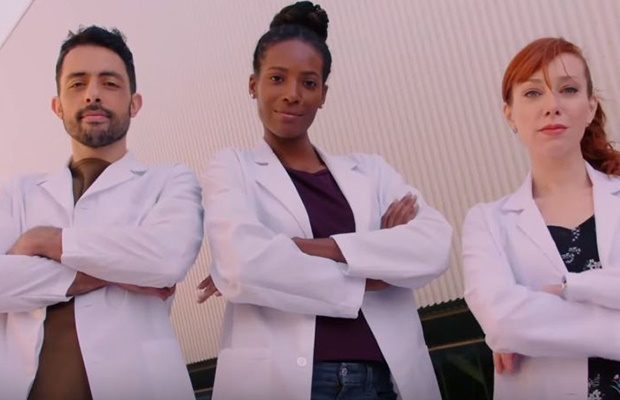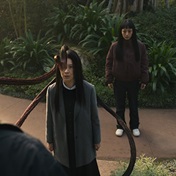
OUR RATING
3/5 Stars
WHAT IT'S ABOUT:
One hundred hardy souls from diverse backgrounds participate in playful experiments exploring age, sex, happiness and other aspects of being human.
WHAT WE THOUGHT:
One hundred random humans gathered in a facility for experimental purposes may sound more concerning, rather than entertaining – especially under the current health climate – but this new Netflix show offers an amusing distraction the world needs right now.
100 Humans is the streaming service's latest documentary/comical offering that will answer those quirky questions about human behaviour we've wanted to ask, but just never had the guts to.
During what has become a global pandemic and with South Africans preparing for a national lockdown, 100 Humans offers enough entertainment to distract Netflix viewers from the outside world.
The premise of the show sees three hosts – who look and 'act' like professionals but who are in fact reality entertainers – ask some super awkward questions that explore age, sex, happiness, and other aspects of being human, and then test them on one hundred people from diverse backgrounds by having them participate in various experiments.
Alie Ward – American writer, actress, and podcast host who specialises in science and education – comedian Zainab Johnson and comedian Sammy Obeid make up the trio who attempt to make something that should be extremely scientific and serious, fun and uplifting.
Each brings their own sense of humour and while the majority of their jokes are either dry, falls flat or comes across as trying too hard they do a good job of making their 100 human lab rats look good. And while an experimental doccie wouldn't be credible without scientific facts, the hosts manage to deliver interesting titbits in easy-to-digest bite-size doses that won't make you feel confused. Along with the hosts are special visitors who are professional doctors – something the show needed if any of these experiments were going to be believed – and who offer their expert opinion if the experiment falls under their field of expertise.
On to the 100 humans aka the cast of the show – I am very impressed with the colourful, diverse and uniquely entertaining group of people chosen to participate in the experiments. When a show like this includes humans, it is vitally important to include everyone from all walks of life, and they have done this successfully – from all races and ages and including the LGBTQI community – the casting already makes these experiments more believable and less flawed than they really are.
At the start of the show, the hosts make sure to leave any biased opinions, about the humans that is, at the door by dressing them in matching navy blue slacks. Each is also assigned a number, which is essentially their new name. This is done so neither the viewer nor any of the other humans are given room to form an opinion of any human based on the way they dress/their usual appearance, which, okay, is fair, because let's be honest, we can all be a little judgemental sometimes.
That being said some humans will stick to you and you will find yourself following them and looking for them in each experiment, such as *Human #28 – keep an eye out for him – while others will become mere space fillers.
On to the actual experiments. When it comes to the accuracy of the experiments, I have my doubts. As I briefly mentioned earlier, one of the major flaws of 100 Humans becomes noticeable when they lean more towards the scientific aspect of an experiment. Yes, they have a diverse group of people to test; however, the study population is too small of a group for actual scientific study. Another flaw is the lack of consideration for human error.
I will use one experiment as an example, as I don't in any way want to deter viewers from watching this light-hearted and entertaining show. In the second episode, one of the experiments sets out to answer which age group is best at communication and teamwork and did so by having one person from each group be given an instruction manual of pictures. They could then only give instructions based on the pictures to a person who is blindfolded. That person then explained the instructions to the rest of the age group who were actually attempting to assemble what is being described. This seems fair at first; however, this experiment was only done once, and the end results didn't take into account that the people in the communication roles may not have been the best suited within their group.
100 Humans may not be the Mythbusters you are looking for, however, the show offers enough entertainment to provoke head scratches, outbursts of laughter and perhaps stimulating debates and discussions with whoever you may be in lockdown with.
WATCH THE TRAILER HERE:




 Publications
Publications
 Partners
Partners















